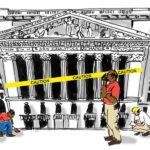Competition among small banks is leading to some looser underwriting standards.
The following is part of a series marking the 10 year anniversary of the financial crisis.
When Lehman Brothers collapsed, Jeff Deuel, president and CEO of Heritage Bank, was working at a financial institution at the heart of the subprime mortgage crisis: Washington Mutual, the Seattle-based savings bank, also known as WaMu, which filed for bankruptcy 11 days after Lehman Brothers went under.
It was the largest bank failure in U.S. history based on assets under management.
Deuel, who worked in WaMu’s more profitable commercial lending division, says he “didn’t see a lot of the bad stuff until the end.” He left shortly after JPMorgan Chase bought WaMu’s banking operations 10 days after the Lehman collapse.
Deuel joined Washington-based Heritage Bank in 2010 to help with acquisitions of banks that were failing because of the financial upheaval. That year, Heritage bought two failed banks in Washington – Cowlitz Bank in Longview and Pierce Commercial in Tacoma. Cowlitz had concentrations of non-performing loans, while Pierce’s mortgage operations were in trouble.
SEE RELATED STORY: LEARNING TO DO BUSINESS THE PORTLAND WAY
Small community banks that failed had one thing in common: They held concentrations of loans that did not perform well, especially loans tied to real estate.
“Many failed because they had heavy reliance on construction lending. Now all the banks I am familiar with in Washington and Oregon are focused on keeping a balance in their loan portfolio so they don’t get overweighted on construction loans or any other category,” he says.
Lending standards in real estate are more robust these days. Most of the local construction companies that community banks lent to during the financial crisis went under, he says. The larger and better capitalized national builders now dominate the market.
Mortgage lending practices also changed abruptly. Regulators clamped down on fraudulent practices that preceded the crisis. These included providing mortgages to lenders with poor credit history and little to no down payment.
Nevertheless, Deuel says extreme competition among banks is “causing them to be liberal on price and structure” of loans. “It is unfortunate that it is setting up the industry for looser underwriting standards,” he says.
Heritage Bank has grown aggressively through acquisitions over the past several years. It most recently bought Premier Commercial Bancorp of Hillsboro in March for $88.6 million. The expansion is making the bank’s operations more complex because of the broader group of employees who are originating loans. Bank regulators are keeping an eye on how the bank is managing this growth, says Deuel.
“We are focused on maintaining our corporate culture. It gets harder to do as you continue to grow and expand your geographic footprint,” says the CEO. “You have to have more robust processes to oversee that and monitor it to make sure your risk profile is not changing because you have gotten bigger.”
Read more in this series on the financial crisis:
The legacy of the financial crisis 10 years on
‘History doesn’t repeat itself, but it rhymes’
‘I get the impression everyone thinks another financial crisis is around the corner’
‘Less regulated, non-bank lenders are making higher risk corporate loans’







